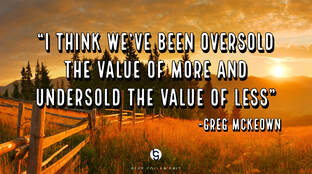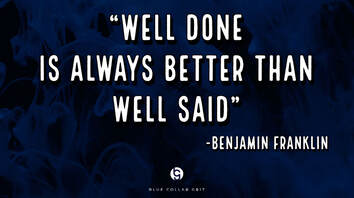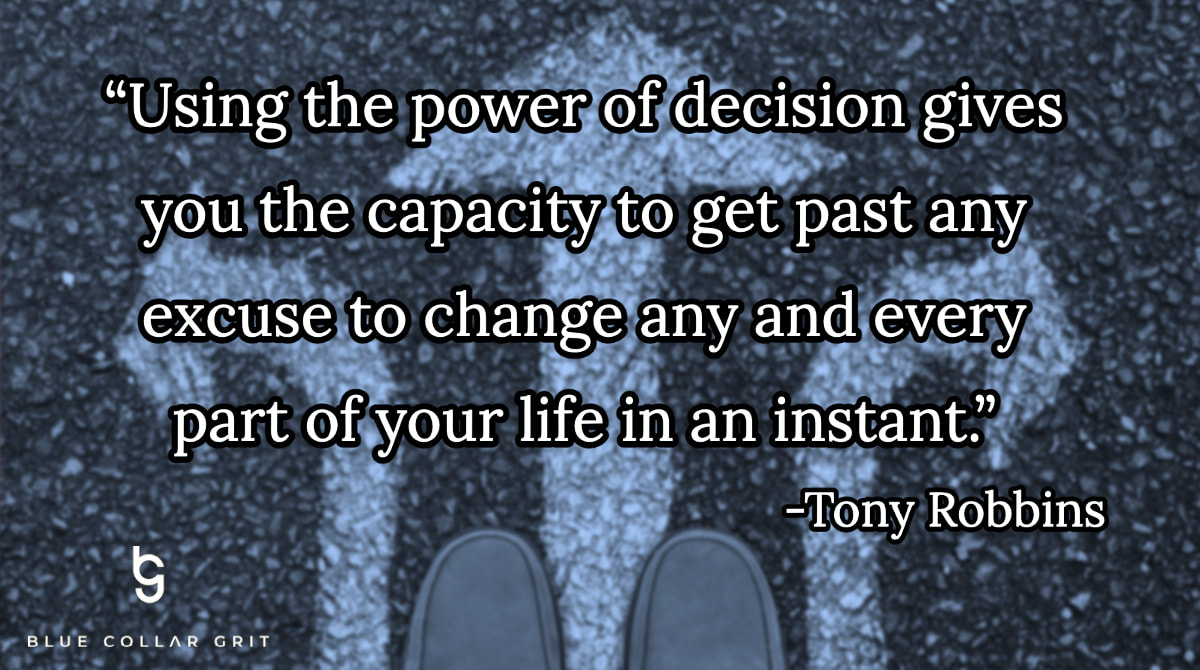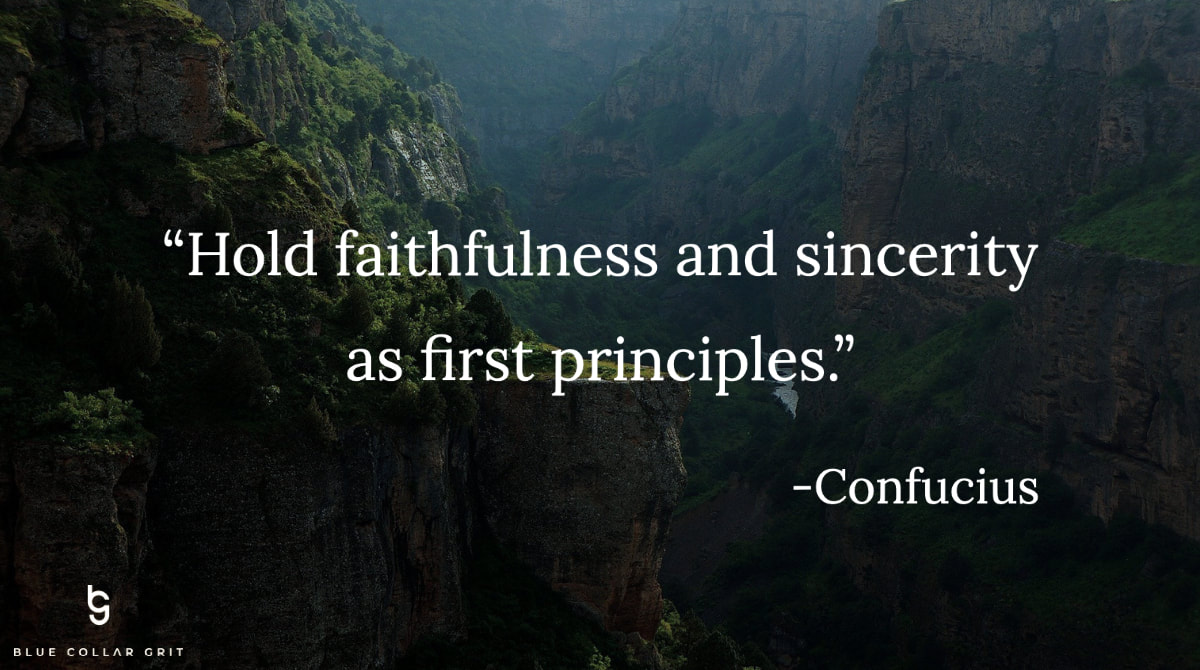Stay SimpleSimplicity is something we know is good for us, but we resist it.
We want it, but deny it. I don’t think there is any one reason for our continuous pursuit of more, but I do think it’s ruining our lives. With a few exceptions, there is little that ‘more’ actually helps with. Nonetheless, we treat it like the answer to all of our problems. This is as true in leadership as it is in life. Why Should We Care? In an effort to pretend like everything is important, we attempt to spread our time over a multitude of seemingly critical matters. Just go to the bookstore, or do a quick search, and you’ll find dozens of books pointing you in hundreds of different directions. While all make strong cases, the validity of each resides with each individual. Simplicity begins with self-awareness. Without a clear understanding of what we believe, we have no idea what to stand for - making simplicity impossible. We are left, like most, bouncing from fad to fad while never really committing to anything. As a result, we fool ourselves into thinking we’re living a full life. In reality, it’s indifferent. The culture of most teams follows the same path. We neglect the responsibility as a leader to clearly define what is important in an effort to pretend like everything is important. It’s not. By identifying what matters the most, we shine a light on what those we are leading should be focused on. We can’t expect to effectively cast a vision, hold others accountable, or drive the mission without articulating the critical. Just as we need to highlight the important, we also must recognize what should be eliminated. Simplicity results from the combination of these two. REAL TALK - Action Steps The cleaning of our team’s culture isn’t easy. We tend to value what our previous teams valued, ideas that are in vogue or popular, and things we’ve read or seen work for others. None of those are innately wrong, but they’re not innately right either. We have to do the work to identify what needs to go and what needs to stay.
It’s fascinating to me, really. Everyone tells their teams basically the same things. Yet, some teams consistently do those things while others don’t. I believe a large part of it is how diluted the message becomes for so many. The willingness to stick to the few, simple anchors is but it’s the only way to truly have a culture. You have to stand for something or you stand for nothing. For more information on building excellence in your teams, visit us at www.bluecollargrit.com. We would love to know how we could help!
0 Comments
The Standard: VulnerabilityWhen we assume a leadership position, we are often focused on spreading our vision or creating our mission statement. It’s an exciting time, guiding others into new territory, but none of those things are the most important job you have as a leader.
Since Jon Gordon’s The Energy Bus book, the talk with a lot of leaders revolves around getting the right people on the bus. I love the concept, but the concept begs the question: how do we know who the right people are? Although I don’t think there is a concrete answer that applies universally, I know one characteristic that is consistent with all good teammates. They’re willing to be vulnerable. I first read the phrase “vulnerability precedes trust” in The Culture Code by Daniel Coyle and have found it to be one of the most accurate, and useful, leadership principles. Not only does it precede trust, but it also fuels it. I’ll offer two examples from our teams that have established the standard for vulnerability in our program. Case In an early season team meeting in 2012 we were doing an exercise called “Favorite Scar Story” in which each team member shares the story around one of their scars. This is typically a fairly safe activity, meaning most people will pick a story that isn’t too revealing. But, it always depends on the individual and that person’s courage. Courage is something Case was never short on. Our first two players followed the typical script. One spoke on a scar on his knee from a bike wreck when he was seven with his brother. The next remembered the scar on his knee from a surgery when he was twelve. Both served the purpose of the exercise of gradually allowing a safe space for players to be vulnerable. Then Case spoke. He shared the story of losing his mom to cancer when he was ten, then his dad passing from a heart attack at thirteen. He talked about the pain his mom endured, how she never complained. And he talked about moving from New York to live in Ohio with his brother to finish high school. His voice fluctuated between confident and scared, unsure of how his story would be accepted by his teammates yet certain he needed to share it. His teammates were silent, fully engaged and connected to every word. They accepted him - they trusted him. And the remaining scar stories … they weren’t at the level of vulnerability as Case’s was, but they weren’t superficial and trivial either. His vulnerability led to a much greater level of vulnerability than was previously shared. Case’s vulnerability set the tone for not only his team, but the level of expectation for teams following him. Max A few months into this season we had a skull session revolving around the idea that you don’t get what you want, you get what you are willing to sacrifice for. This discussion led to an activity we do most years called Team Lent. Each player shares something they are willing to give up for the team. The more significant the sacrifice, the greater the commitment to the group. We began with players giving up the normal things teenagers will give up - XBox, NetFlix, Social Media, etc. Then we got to Max. Max was a talented senior that would have been a mainstay on the court for many other area teams. He had worked extremely hard, never missed a workout, and committed himself fully to earning playing time for our team. He was the kid you rooted for as a coach - you wanted things to workout for him. And they did workout, just not the way either of us expected. By the time we had gotten to the point of this meeting, it was clear Max wasn’t going to get to play a lot of significant minutes. He had several really good underclassmen in front of him at his position and minutes would be hard to find. The disgruntled senior sitting behind younger players is the textbook culture killer for a lot of teams. At the time of this skull session, no one was really sure how Max was going to handle this role. Max pulls his student ID out of his locker and shows it to the team. This recount of Max’s message doesn’t do it justice, but it touches on the primary points. “This is my ID, but it’s representing my identity right now. I’ve worked really, really hard to become the best player I could and I want to play. I believe in what we do, I believe in our core values, and I believe in this team. I’m done worrying about me. I am giving up my individual identity for the identity of the team.” The room was silent and the team was emblazoned with a unity that lasted the entire year. Max’s message grew from Case’s example and set the stage for a historic season. I realize we can’t select our team solely on vulnerability. There are many other factors that must be considered, and that are important for any group to maximize its potential. That being said, it’s hard to go wrong with a teammate that is self-aware, humble, and courageous enough to initiate high levels of vulnerability with your team. I would argue that they are THE most important pieces to the entire puzzle if excellence is the pursuit. For more information on building excellence in your teams, visit us at www.bluecollargrit.com. We would love to know how we could help! Is Perception Reality?I’m sure you’ve heard the popular quote, “Perception is reality” attributed to Lee Atwater. While I understand, and can appreciate, the intent behind it; I find it difficult to fully accept.
Reality is often thought of as a strict, rigid truth. Something that doesn’t vary, never changes. It either is or it isn’t. This absolute view of reality leads us to judgement of right or wrong, agree or disagree. Afterall, if reality is … well, real. Then any view contrary to it becomes inaccurate. Perception is generally considered one’s opinion, not a truth. It’s something that depends on the person and could even change from day to day, situation to situation. There is nothing absolute about a perception, everyone’s is slightly different. It’s practically impossible to completely agree on. Here’s the thing though, it doesn’t matter. Perception or reality, doesn’t matter. Why Should We Care? We spend far too much time trying to figure out who is right. We would be much better served to spend that time, and effort, pursuing understanding. For example, our perception of another person’s intent in a conversation is meaningless. We are usually ignorant to that person’s experiences, priorities, and feelings. Attempting to predict someone’s perception without knowing those factors is futile. Our focus should be understanding. Seeking to understand allows us to fend off the desire to judge. There is no good or bad. This, of course, is a challenge. When we hear, feel, or experience something our brain immediately creates a story to help us make sense of that situation. It often takes the form of blaming someone else or defending our actions. Of course, we think our story is true. Unfortunately, it rarely is. This is precisely why we need to dismiss all of our stories and begin searching for understanding. REAL TALK - Action Steps Our perception is a result of our stories. And, our reality is dependent on our experiences. Neither is absolute. But, both are important. It should be our goal to understand our perceptions and define our reality. We should be doing the same for others.
Our perceptions are a result of our stories. Our reality is the processed version of that reality. In order for either of those to be trusted, we must take the time to recognize that our initial experience, thought, and feeling is a fraud. For more information on building excellence in your teams, visit us at www.bluecollargrit.com. We would love to know how we could help! Choosing Other's Path
Faithfulness
|
About bcI'm a teacher, coach, and parent seeking excellence while defining success on my own terms. Archives
April 2024
Categories |






 RSS Feed
RSS Feed